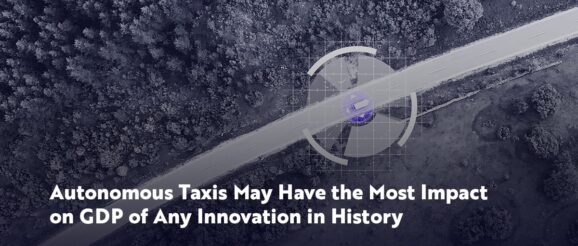Autonomous Taxis May Have The Most Impact On GDP Of Any Innovation In History

Autonomous vehicles could be one of the most productive innovations of all time, impacting global gross domestic product (GDP) by approximately 20% over the next decade, according to ARK’s estimates shown below. Previously, ARK has shown that autonomous cars potentially could reduce[1] accident rates and cut[2] transportation costs. In this piece, we examine the outsized impact that autonomous taxis could have on the global economy. 
Sources: ARK Investment Management LLC, 2023. This ARK forecast is based on underlying data from external sources, including data from the International Monetary Fund Datamapper (https://www.imf.org/external/datamapper/NGDPD@WEO/OEMDC/ADVEC/WEOWORLD), which may be provided upon request. Data as of June 27, 2023.
Note: The consensus estimate figure does not include the potential impact of robotaxis. Forecasts are inherently limited and cannot be relied upon. For informational purposes only and should not be considered investment advice or a recommendation to buy, sell, or hold any particular security.
Weighing the potential positive economic impacts of autonomous taxis against the potential negative economic impacts, ARK estimates that net GDP gains could approach $26 trillion by 2030. If so, the boost would be ~26% the size of the US economy today, as broken down below.
Sources: ARK Investment Management LLC, 2023. This ARK forecast is based on underlying data from external sources, including data from the National Highway Traffic Safety Administration (“The Economic and Societal Impact Of Motor Vehicle Crashes, 2010 (Revised).” https://crashstats.nhtsa.dot.gov/Api/Public/ViewPublication/812013), which may be provided upon request. Data as of June 28, 2023.
Forecasts are inherently limited and cannot be relied upon. For informational purposes only and should not be considered investment advice or a recommendation to buy, sell, or hold any particular security.
If autonomous vehicles save ~30,000-35,000 lives in the US and ~1.2-1.5 million lives globally, their impact will be unequivocally positive. That said, as measured by GDP, the impact will be a little more nuanced. On the negative side of the GDP ledger, autonomous electric passenger cars probably will lead to fewer accidents,[3] which, while good for passengers and drivers, could hurt economic activity. A reduction in accidents would result in fewer repairs, fewer hospital stays, and lower insurance take-rates, reducing GDP by ~$1 trillion per year. The negative impact of fewer accidents on GDP, however, should be more than offset by the positive unmeasured economic benefits associated with preserving lives and reducing injuries. In addition, employees who otherwise would be out of work should continue to contribute productively to economic activity, adding $3 trillion to global GDP per year, according to ARK’s estimates.
Once freed from manual driving responsibilities, passengers in autonomous vehicles could benefit from enhanced safety as well as newfound free time. In the US, the average car owner drives more than 420 hours per year—10 work weeks.[4] Passengers in autonomous vehicles should be able to work or play—catch up on emails or stream films—both of which would have a positive impact on GDP. According to ARK’s research, the productivity uplift could be ~$17 trillion globally.[5]
In addition, ARK’s research suggests that electric vehicles will dominate autonomous travel, thanks to lower operating costs and prices as they resync in line with Wright’s Law.[6] As a result, GDP would lose the ~$1.2 trillion in annual fuel and maintenance revenues associated with gas powered cars globally.
Finally, because autonomous taxis should offer lower costs per mile traveled, ARK expects personal auto sales to drop in urban areas, hitting GDP by ~$1.8 trillion per year, though partially offset by ~$1 trillion in autonomous car sales to fleet operators. Autonomous cars, in turn, could transform unpaid driver activity into measured economic activity and potentially generate ~$9 trillion in service revenues[7] annually.
By 2030, therefore, we believe personal autonomous travel could add a net $26 trillion to global GDP per year. On the positive side of the ledger, GDP could increase $30 trillion, thanks largely to autonomous ride-hail service revenues and the increased productivity associated with found time. Negatively, it could hit GDP by $4 trillion per year based on the measured economic impact of fewer accidents, lower gas-powered vehicle sales, and lower fuel and maintenance costs.
ARK expects autonomous ride-hail to add ~2-3 percentage points to global GDP per year by 2030—an economic impact greater than the combined boosts delivered by the steam engine, robots, and IT, as shown below. In other words, we believe autonomous taxis could be the most impactful innovation in history.
Source: ARK Investment Management LLC, 2023 and Bughin et al. 2018. “MGI Notes From The AI Frontier: Modeling The Impact Of AI On The World Economy.” McKinsey Global Institute. ARK forecasts are based on underlying data from external sources, which may be provided upon request.
Forecasts are inherently limited and cannot be relied upon. For informational purposes only and should not be considered investment advice or a recommendation to buy, sell, or hold any particular security. Past performance is not indicative of future results.
As global growth potentially nearly doubles from 3.3% per year to ~6% thanks to autonomous taxis, the consumer likely would be the biggest beneficiary. Consumer purchasing power could increase as transportation costs drop, and time freed from unpaid driving could increase by ~10 weeks.[8]
For more research on autonomous technology, please download ARK’s latest autonomous mobility white paper.[9]
